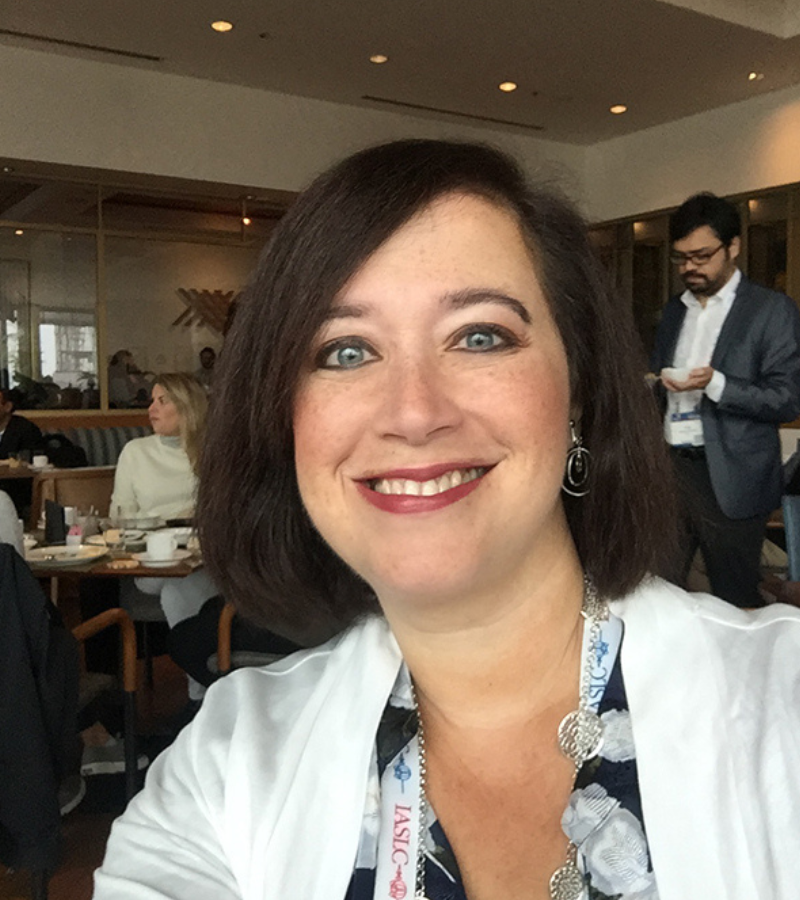
On June 23, 2024, the lung cancer community at large lost a beloved advocate, Ivy Elkins. Her story is a testament to the importance of lung cancer research and advocacy, and her legacy inspires us to push forward in our mission.
IVY ELKINS’S STORY
No one gets elbow cancer
Like so many before her, Ivy Elkins’ road to a lung cancer diagnosis was indirect and complicated. It was the summer of 2013, and she was plagued by pain in her elbow and neck. Visits to her primary care physician, an orthopedist and six months of physical therapy provided little relief. She recalls casually inquiring if it could be cancer.
“No one gets elbow cancer,” she was told.
Ivy did not have elbow cancer, but an MRI revealed that the pain in her elbow was caused by a mass – an adenocarcinoma – which was literally eating away at the joint. In order to discover where the primary cancer was, an orthopedic oncologist ordered a PET scan. Ivy’s primary cancer was in her lung. She had no symptoms and had never smoked.
EGFR and Targeted Therapy
Biomarker testing showed that her lung cancer had the EGFR mutation which made her eligible for a targeted therapy which had been approved by the Food And Drug Administration (FDA) just a few months earlier. Ivy’s treatment plan was simply a daily pill – she would not need to undergo surgery, chemotherapy or radiation. The 47-year-old mom of two tweens was thrilled to have been spared what can be difficult side effects from traditional lung cancer treatments. The targeted therapy kept her disease at bay for three years.
Then Ivy’s cancer began to find its way around the drug.
Sadly, it is not uncommon for the cancer to outsmart the drug. Many patients find that their cancer develops resistance to targeted therapy, resulting in the possibility of further metastases and mutations. In Ivy’s case, it was the T790m mutation. And, just as luck was on her side when she was first diagnosed, it was again. Just months prior, a therapy targeted to her new mutation had been approved by the FDA, one of the many new therapies approved within the past several years. The importance of ongoing research cannot be understated. Ivy stayed, and remained stable on that drug for over seven years..
Advocating lung cancer research for herself
“At my regularly scheduled appointment in January, 2020, my oncologist mentioned that this might be a good time for me to get a PET scan. While some people living with cancer get frequent PET scans, my oncologist doesn’t order them routinely. I only had one previous PET scan — when I was first diagnosed. However, I had not experienced cancer growth anywhere other than progression in my main tumor in 2016, which was resolved with a change in my targeted therapy medication. My oncologist somewhat casually mentioned that if the only spot that lights up in the PET scan is this primary tumor in my right lung, maybe we could consider radiating it.
After several insurance denials and appeals, I had a PET scan and that was exactly what happened. The only spot that lit up was my original tumor. There was even a statement on the PET scan that read “no evidence of local or distant metastatic disease.” Naturally, I really liked seeing that! I had another surprise in store when I met with my oncologist: she told me that a lobectomy of my upper right lobe could now be an option for me. This would be considered “local consolidative therapy” and might lead to an improved future prognosis for me.”
Because Ivy is a stage 4 lung cancer survivor, she had scar tissue from prior nodules that had disappeared with treatment and adhesions caused by years of targeted therapy, so her surgery wound up being more difficult than the more standard lobectomy that a stage I patient might have.
However because her surgeon, Dr. Jessica Donington, a member of our Scientific Advisory Board is so skilled, she still managed, despite the challenges, to perform Ivy’s surgery as a Video-Assisted Thoracic Surgery (VATS). VATS is a minimally invasive surgery where the surgeon makes three small incisions in the chest wall. Then using special camera and surgical tools inserted through those incisions, Dr. Donington was able remove Ivy’s upper right lobe while viewing the inside of Ivy’s chest through images from the camera. Ivy reports that now, a little over a year later, she is feeling great and is proudly (and surprisingly) NED (no evidence of disease)!
Advocating Lung Cancer Research via EGFR Resisters
At the time of her diagnosis, Ivy, a married mom of two boys had been thinking about returning to work in finance. As her treatment began, and she had virtually no side effects, she decided instead to become a lung cancer advocate. And boy did she!
Since her diagnosis, Ivy has completed Advocate Training through the American Association of Cancer Research. She then created and moderates two Facebook groups – close to 500 members strong – where they share information regarding clinical trials and treatments. Their primary goal is to work as a group to get the attention of lung cancer researchers.
She’s had many speaking engagements across not only the United States, but Europe as well. Ivy is even a full voting member of the Department of Defense’s Congressionally Mandated Program for Lung Cancer. She’s a member of LCFA’s Speakers Bureau where she’s already worked on the Hope With Answers video project.
Ivy is living proof of the importance of ongoing research and is doing more than her part to advocate for herself and her fellow lung cancer patients.


